Rambling Through the Byways and Crossroads of Genealogy, DNA, and Ethnicity
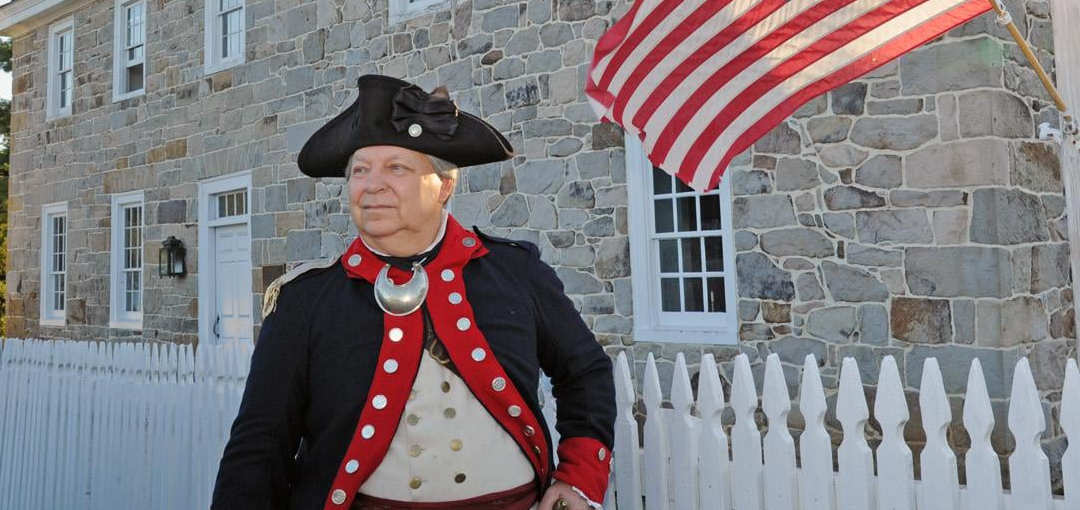
Last week I was having one of my “bed times” as I just wasn’t sleeping well. Uh, I wasn’t sleeping at all! Most of this is my cancer issues and the side effects of my latest medications. But, it’s also a result of thinking what I will write next for this site! My thoughts moved in all different ways with the main theme being: Do we really have personality traits that are a result of what we have inherited? Do our ethnicities have much to do with how we approach our daily life? Does one’s interest in genealogy bring about the way we dress and act around others?
I outlined my ideas for Andrew in an email, and he reminded me that I have written essays on similar subjects, namely in November of 2021 and August of 2022. I refer our readers back to those articles for a quick review. I do have to keep reminding myself that when writing about these subjects, which most people take very seriously, I keep my tongue in my cheek.
What drew me to genealogy when I was a boy was the idea that all my Hagenbuch relatives who lived near us on the farm in Montour County were not just related by blood, but also they were related by the way we all thought and acted. As a boy I knew nothing about DNA, but I did know that we had a German background. Even then, one had to be careful to admit to having German ethnicity because of the stigma of what happened before and during World War II. However, we believed that the Germanness we touted showed others that we were intelligent, organized, inventive, stuck to what we believed in, that we possibly had a positive but hard temper—you get the idea. These were traits we were proud of.
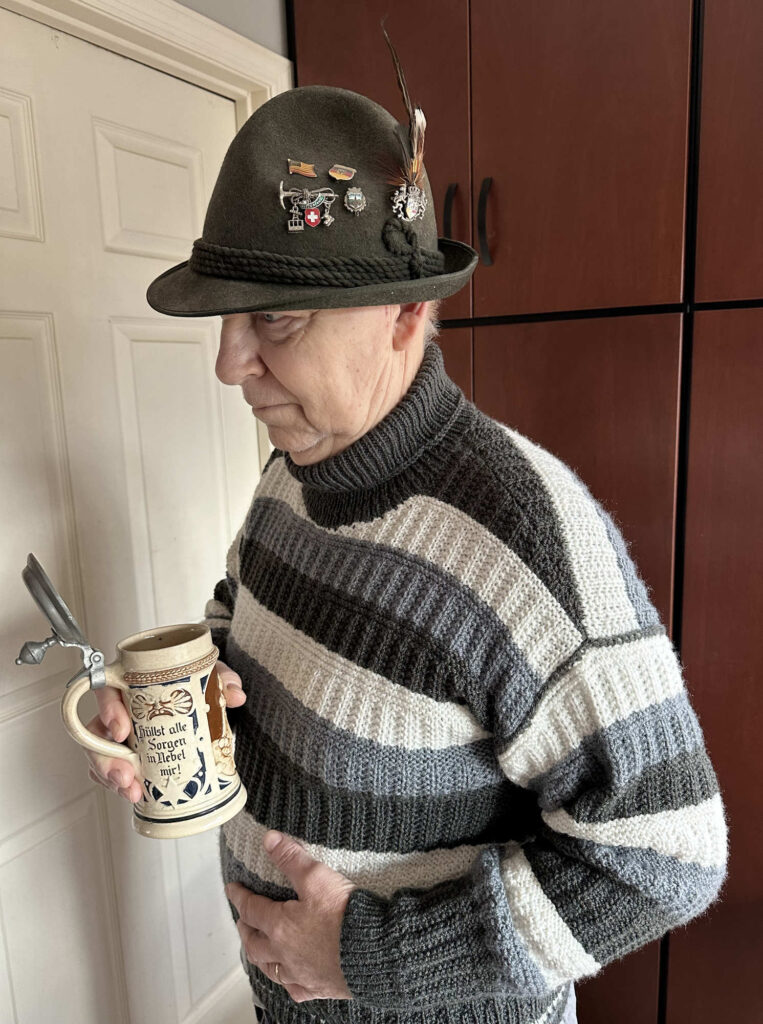
Enjoying that Germanic European heritage. The sweater was made by Regina Hagenbuch from Edesheim, Germany in the early 1980s.
As time goes by in any genealogist’s search of their family, more roads are discovered. With us Hagenbuchs we find we are, as I tell people, probably more Swiss than German. Our Hagenbuch family only lived in Germany for 85 years after moving from Switzerland in 1652 to live in Germany; and then leaving Germany in 1737. That was the year Andreas Hagenbuch came to America. But, wait! Can we even say our family lived in Germany for 85 years? It was not called Germany until the mid-1800s. Up to that time, it was a confederation of small states or duchies where most folks spoke German. Our family lived in and around the present-day village of Leingarten which was in the Duchy of Württemburg. People there did not consider themselves German, and other than their language (which had different nuances from area to area) they were often quite different than people living in the areas of the Rheinland and Saxe-Coburg.
So, scratch the idea that we Hagenbuchs are specifically German. However, we can call ourselves Swiss-German. Our roots in Switzerland are deep. Along with some other relatives, wife Linda and I visited the town of Hagenbuch to the northeast of Zürich in 1979. We even enjoyed cheese fondue and an Alpine horn concert! I proudly claim Swiss as one of my main ethnicities.
Time goes on a bit more. As Andrew and I did more research, we began to identify ourselves as Pennsylvania German or Pennsylvania Deutsch or, best of all, Pennsylvania Dutch. This opens up a whole new realm and when imparting that knowledge to some folks they want to know if we are Amish or Mennonite. Neither! The Hagenbuchs were not of the plain Dutch folks but of the fancy Dutch who were mostly Lutherans. So, putting all DNA aside, the question is: “Do we have personality traits that are dictated by being Swiss/German and Pennsylvania Dutch”?
At this point we come to a crossroads which I hinted at back in November of 2021. If there wasn’t a tradition of patriarchal surnames, my name would not be Hagenbuch. I Identify myself strongly as Swiss-German and Pennsylvania Dutch because of that surname. In my direct lineages, many of my matriarchal surnames are also from those ethnicities too: Faus, Sechler, Kunz and Schmutz. But what of my other family names? What if I had been given the surname of McWilliams or Davis instead? These are Scottish and Welsh respectively. We have come to the crossroads and are now veering off on another byway.
As many of you know, you’ll sometimes see me wearing a kilt. A Pennsylvania Dutchman in a kilt? I often tell people, there is a story here, as there is a story with everything. I became interested in kilts and Scottish history way back in 1992 when two movies about Scottish history came out. After a few years of dabbling in kilt culture, I joined an 18th-century reenactment group that portrayed Scottish soldiers fighting with English soldiers. (England and Scotland are both part of Great Britain, hence being British). However, before the kilts took over my imagination in 1992, I was reenacting a soldier during the Revolutionary War who was from Berks County—an American patriot—which makes the most sense since that’s what our Hagenbuchs were.
When I began learning kilt culture and joined a British reenacting unit who were Highlanders, I found it to be a lot more fun than portraying a Dutchman. As a Highlander, there was more to talk to people about, more standout clothing to wear, bagpipe music, a warrior culture with interesting weapons, and a unique history of the Highland Scots to reveal to the public. It was more fascinating being Scottish than it was being Pennsylvania Dutch. Best of all, I could truthfully say I was part Scottish because of my great great grandmother who was a McWilliams (or MacWilliam).
This led to a whole new way for me to think of my family. No longer was I only Swiss or German, but I had Welsh and Scottish backgrounds too. Wales has always been a curiosity to me: words with no vowels, eating raw leeks, and the best singers in the world! Yet, it’s the Scottish culture that I mostly embraced. Soon, I was eating haggis, although that didn’t replace my love of scrapple! I was drinking a wee bit of Scotch whisky at times instead of just German beers. I was speaking in a faux Scottish accent. I do enjoy bagpipe music and Scottish tales of history. And, I am even known in reenacting circles by a nom de guerre—my Scottish first person impression—Malcolm MacWilliam! While this is cool, it does not recognize what we are truly made of.
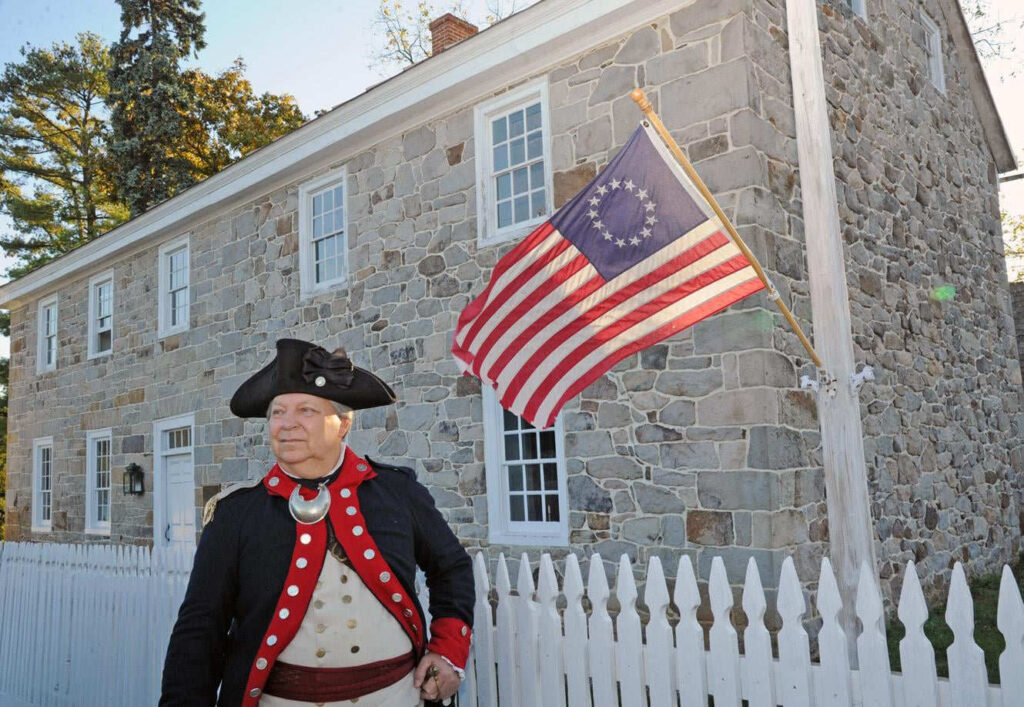
We Hagenbuchs are first and foremost Americans. Standing outside Dill’s Tavern, I am in the uniform of a Continental officer (American Revolutionary War).
Whether we like it or not, we are part of the patriarchal surname tradition. If our surnames were matriarchal (similar to some other regions of the world), I could be Scottish with the McWilliams name, or I could be Welsh with the Davis name. But, for all intents and purposes, I am a Hagenbuch. I identify not as Scottish and not as German, but as a fellow whose family members were Swiss, and upon coming to America they were identified as the fancy Pennsylvania Dutch. Although, more than anything, I am American. I am a mongrel, who is proud of all my ethnicities that have been rolled into my American personality.
There is no American DNA. My DNA identifies me as 53% Germanic European (which includes my “Swissness”), 17% Scottish, 14% Welsh, and 13% Scandinavian (which relates to the northern Scots). However, the fact is that I am an American Hagenbuch, which is what my 5th great grandfather, Andreas, and his descendants also identified as. I may at times identify myself as other ethnicities. But they don’t hold a candle to the facts. As we come to the end of this byways and crossroads journey, I am Mark (proud to be) Hagenbuch!

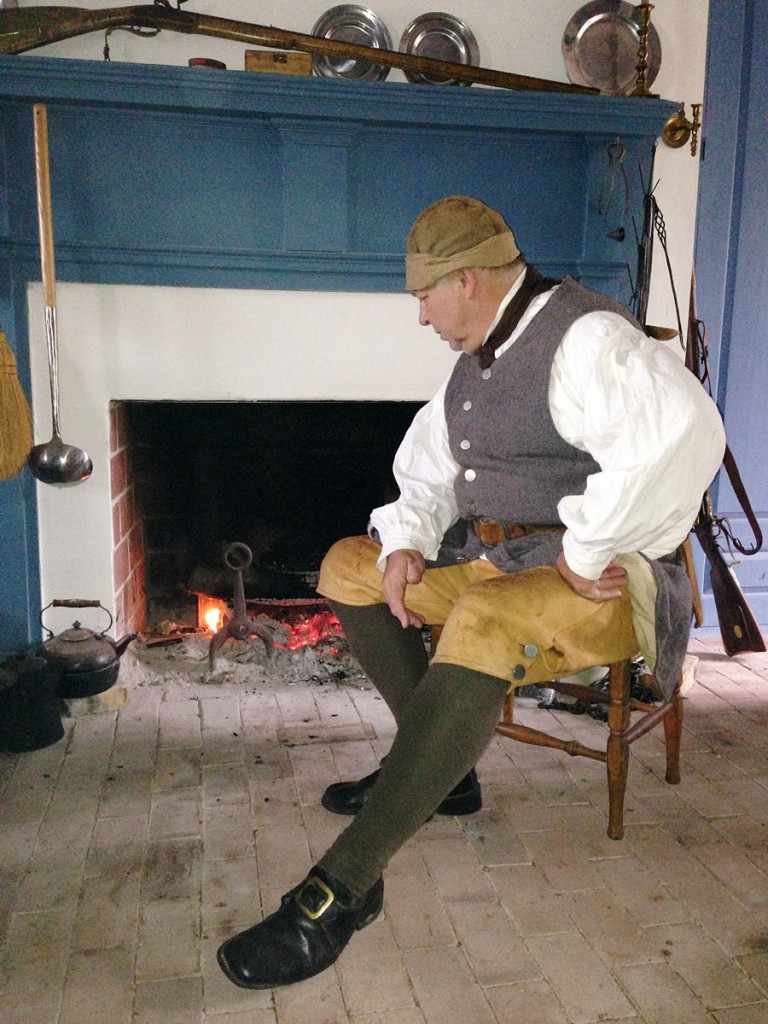
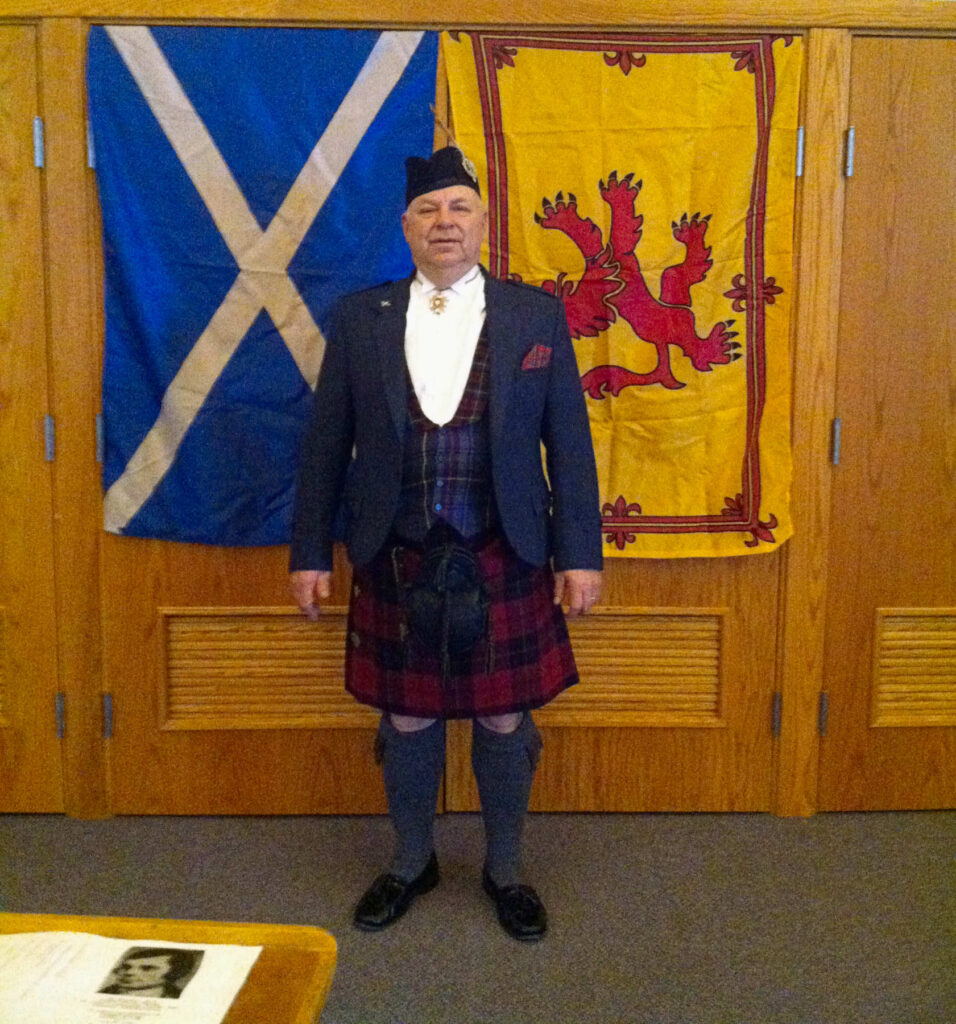
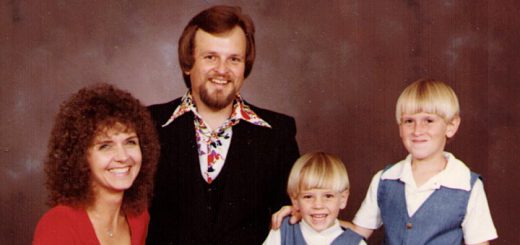
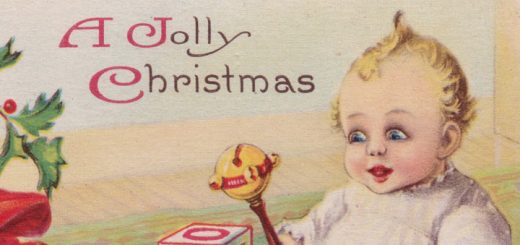
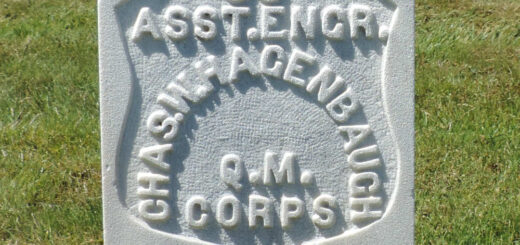









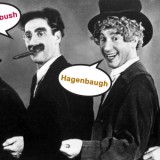




Very good read, Mark! I really appreciate your, and Andrew’s dedication to this weekly publication!
Nice piece. The parallels with my Kistler line are striking. Most extraordinary is that (we think) the Kistlers migrated from Switzerland (near Zurich) to Germany about 1652 and then to Philadelphia in 1737. I have as much Scotch and Welsh DNA as Swiss/German.
Hi Mark,
Great essay! I am in the same boat. I have German, Irish, Scottish, English, Dutch, and even Finnish ancestry, but I always identify as German. And what is “German?” Historically, as you touch upon, Germans were a group of related, once tribal people, who spoke often rather different dialects of a common language. Although one can see antecedents of Germany in the medieval The Holy Roman Empire, there really wasn’t a Germany in the modern sense until the 19th Century. Back to tribes: Swiss are Alemannic Germans, quite distinct from the Franks of Hesse, or the Saxons of Hamburg, and closely related to the “French” living in Alsace and Germans living in Baden-Württemberg. So Hagenbuchs descend from the Alemanni and their predecessors, the Suebi or Swabians. Julius Caesar gives a good account of his encounters with the Suebic King Ariovistus. It’s quite a heritage. Our remote ancestors surely fought Caesar, but they lost. Three centuries later the Alemanni would invade the then decaying Romam Empire.
Best regards,
Bob Carl